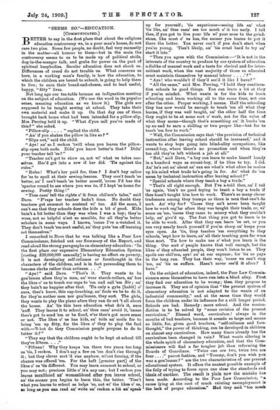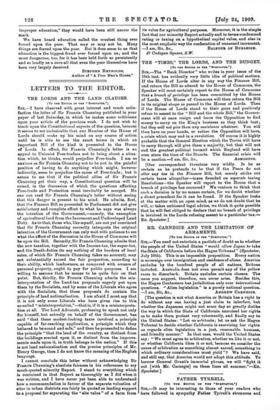13 ETTER to say in the first place that about
the religious education controversy we, in a poor man's house, do not care two pins. Some few people, no doubt, feel very earnestly in the matter—all honour to them—but in the main the controversy seems to us to be made up of political strife, dog-in-the-manger talk, and grabs for power on the part of spiritual busybodies. Secular education does not shock us.. Differences of creed do not trouble us. What concerns us here, in a working man's family, is how the education, to which the children are bound to submit, is going to help them to live ; to earn their bread-and-cheese, and to lead useful, happy, " fitty" lives.
Not long ago our tea-table became an indignation meeting
on the subject of education. (We use the word in its popular sense, meaning education as we know it.) The girls are• supposed to be taught sewing at school. They take their own material and make it up. On that day one of them brought back home what had been intended for a pillow-slip. Mrs. Perring held it up. "What d'you call you've made of this F" she asked.
"Pillow-slip . . . . "replied the child.
"An' if you shakes the pillow in like so " "Slips out," said the child.
" Aye ! an' so I reckon 'twill when you leaves the pillow- slip open both ends. Didn' you know better'n that ? Dian' your teacher tell 'ee F"
"Teacher an't got to show us, not wi' what us takes our- selves. Her'd get into a row if her did. 'Tis against the rules."
" Rules ! What's her paid for, then P I don't buy calico for 'ee to spoil at their sewing-lessons. They won't teach 'ee better, an' I can't teach 'ee better meself, 'cause I'd has the 'spector round to see where you was to, if I kept 'ee home for sewing. Pretty thing !"
"Thee came tell the rights o' it from chil'ern's tales," said Dave. " P'raps her teacher hadn't time. No doubt they teachers got summut to contend wi' too. All the same, I can't see that they schools does the kids a bit o' good. Bids hain't a bit better than they was when I was a boy; they'm wuss, not so helpful n'eet so sensible, for all they'm better scholars in some ways. I knows, 'cause I've a-watched it. They don't teach 'em nort useful, an' they puts 'em off learning ort themselves."
I remarked to Dave that he was talking like a Poor Law Commissioner, fetched out our Summary of the Report, and read aloud the strong paragraphs on elementary education : "In the first place our expensive Elementary Education System [costing 220,000,000 annually] is having no effect on poverty, it is not developing self-reliance or forethought in the characters of the children, and is in fact persuading them to become clerks rather than artisans. . . ."
"Aye!" said Dave. "That's it. They wants to be gen'lemen afore they'll' men, an' wear starch-collars, an' hae the likes o' us to touch our caps to 'em and call 'em Sir ; an' they bain't no happier after that. 'Tis only a gyte [habit] o' ours, thee's know, thin cap-touching, an' fools we be to do it, for they'm nuther men nor gen'lemen, they sort. The girls, they wants to play the piano afore they can do ort 't all about the house. An' tis this here education what do's it, sure 'nuff. They learns it to school, an' thee casn' avoid it, 'cause thee's got to send 'em or be fined, w'er thee's got more sense or not. The likes o' us has kids, an' toils an' moils for to bring 'em up fitty, for the likes o' they to play the fool witb.—Yr bat do they Commission people propose to do to better it ? "
"They say that the children ought to be kept at school till they're fifteen. . . ."
"Fifteen! Why they keeps 'em there two years too long as 'tis, I reckon, I don't say a few on 'em don't rise through it ; but they clever sort 'd rise anyhow, wi'out forcing, if the chance was offered 'ern. For the heft [greater part] of the likes o' us 'tie different. Yon may learn summut to school, or you may not; precious little o' it's any use; but I reckon you learns manlihood an' womanlihood after you leaves gehool, an' the sooner you begins to learn thic, the better. 'Tisn't what you learns to school as helps 'ee, not wi' the likes o' us, so long as you can read an' write an' reckon a IA an' speak up for yourself ; 'Lis experience—seeing life an' what 'tis like, an' thee casn' see too much o' it too early. I tell thee, if you got to live your life wi' your nose to the grind- stone, like most o' us has, the sooner you learns to put it there the better. You never can't if you don't start when you'm young. 'Tisn't likely, an' tis cruel hard to try an' start it late."
"Then you agree with the Commission :—' It is not in the interests of the country to produce by our system of education a dislike of manual work and a taste for clerical and for inter- mittent work, when the vast majority of those so educated must maintain themselves by manual labour . . . ? "
"Aye ! who wouldn't if they'd see'd it like I have ?"
"All the same," said Mrs. Perring, "I hold they continua- tion schools be good things. Yon can learn a lot at they if you'm minded. What wants is for the kids to learn schooling and learn working all to the same time, not one after the other. Proper working, I means. Half the schooling they has now would be enough to teach 'em all what they learns, if they was well taught, an' the other half the thus they ought to be at some sort o' work, not for the value of what they earns—though that's something an' it bucks 'em up no end to earn a shilling or two proper like—but for to teach 'em how to work."
"Well, the Commission says that 'the provision of technical instruction after leaving school should be increased,' and it wants to stop boys going into blind-alley occupations, like errand-boy, where there's no promotion and when they're too old they're left without a job at all."
"But," said Dave, "a boy can learn to make hisself handy in a hunderd ways as errant-boy, if be likes to try. I did. An' he's out an' about an' can see what's what afore he makes up his mind what trade he's going in for. An' what do 'em mean by technical instruction after leaving school F" "Special schools where they teach a boy a trade."
"That's all right enough. But I've a-told thee, an' I tell 'ee again, %isn't no good trying to teach a boy a trade if thee hasn't taught him how to work. There's so many clever tradesmen among they tramps as there is men that can't do nort. An' why for? 'Cause they an't never been taught how to work reg'lar afore they was taught their trade, or, wi' some on 'em, 'cause they came to misery what they couldn't help, an' give'd up. The fust thing you got to learn is to be able to work. After that they can learn 'ee ort, or you can very nearly teach yourself if you'm sharp an' keeps your eyes open. As 'tis, they teaches 'em everything to they schools, 'cept how to learn, an' all their teaching goes for wuss than nort. 'Tis how to make use o' what you learn is the thing. Our sort o' people knows that well enough, but the likes o' they educated people, they won't listen to us. They spoils our chil'ern, aye! an' at our expense ; for 'tis us pays in the long run. They has their way, 'cause we can't stop 'em, an' tis us suffers. Hasn't never see'd it afore? I have."
On the subject of education, indeed, the Poor Law Commis, sionera seem themselves to have run into a blind alley. First they find our education to be wrong ; then they propose to increase it. They are of opinion that "the present system of elementary education is not adapted to the wants of an industrial community," and at the same time they would force the children under its influence for a still longer period. Schools are bad. Remedy : more school. And the contra- diction is to be solved by "some revision of the present curriculum." Blessed word, curriculum ! always in the mouths of bad teathers, because it sounds so large and means so little, for, given good teachers, "self-reliance and fore- thought," the power of thinking, can be developed in children on almost any curriculum. How many times already has the curriculum been changed in vain ? What wants altering is the whole spirit of elementary education, and that the Com- missioners will find a far tougher job than reforming the Boards of Guardians. "Twice one are two, twice two are four ...." parrot fashion, and "Tommy, don't you wish you wuz a gen'leman F" are the two characteristics of our present educational system. It offers the neatest possible example of the folly of trying to force upon one clam the standards and ideals of another. The result is plain now the mistake has been made. According to the Poor Law Commission, "a cause lying at the root of much existing unemployment is the lack of proper education." Had they said "too much
improper education," they would have been still nearer the mark.
We have beard education called the cruelest thing ever forced upon the poor. That may or may not be. Many things are forced upon the poor. But it does seem to us that education is the biggest fraud ever forced upon us; and the most dangerous, too, for it has been held forth so persistently and so loudly as a cure-all that even the poor themselves have been very largely deceived.
STEPHEN REYNOLDS,
Author of "A Poor Man's House."



































 Previous page
Previous page